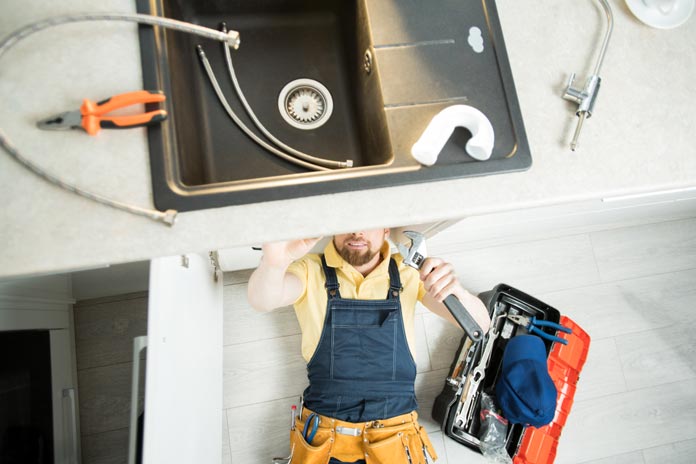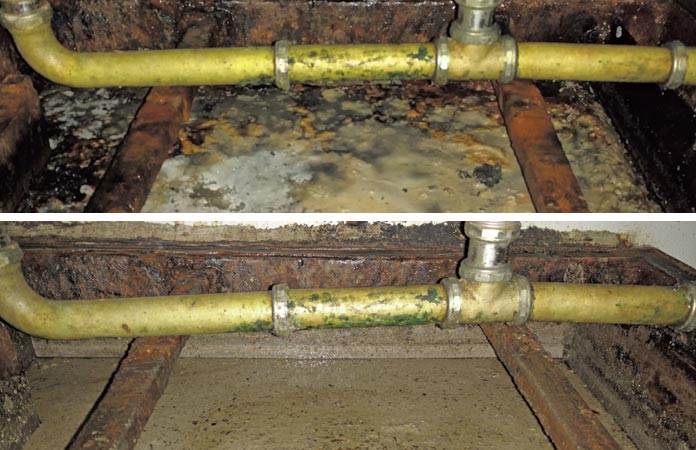
Total Food Service is constantly fielding questions from readers on hot and cold issues the kitchen. The hot items are of course cooking oriented and run the gamut from caring for a range battery to some of the technology associated with a combination oven. On the cold side, it’s the battle to keep ice machines, walk in boxes, and reach-ins working to ensure the best possible customer experience.
What is often overlooked is the role that plumbing takes within each of these crucial segments of a restaurant and foodservice operation. It dawned on us that it was time to explore those plumbing issues as restaurant and foodservice operators head into Spring and Summer.

So, we set out to find and share the plumbing expertise needed for our restaurant and foodservice readers to build best practices strategy for their operations. TFS was able to obtain the thoughts from Joel Matthews, one of Day & Nite’s expert Popular Plumbing technicians, on the link between plumbing and restaurant equipment operating at maximum capacity.
Let’s talk about the priority plumbing issues that a restaurant/foodservice operator should keep an eye out for?
Drain stoppages are essential to watch out for and avoid. They are usually caused by staff quickly moving through tasks. Food and debris get accumulated in the drain, causing stoppages. My best advice to prevent a major issue is to install a strainer or a drain lock, along with getting your drains regularly jetted paired with our environmentally safe microbial treatment to ensure all debris that made its way into the sewer are properly dissolved. These steps will not only keep your drains clog-free but will also prevent any unpleasant odors.
What are some of the other issues you see with restaurants?
Common problems we see can be from the cleaning crew. Often, the staff squeegees the water and any debris on the floor right into the drain, causing a clog. The overflow of water mixed with gloves, spoons, straws, etcetera, causing significant issues within the drain, especially if left for an extended period. I recommend getting a drain lock installed, so the crew has to pick up debris and toss it away.
Can you walk us through some of the drain issues that you see?
A serious problem we see in kitchens is the insects that breed in the drain. Exterminators always try and kill the flies, but they are not going into the floor sinks as needed. So, we jet the lines and use a microbial solution to stop grease buildup and clogs that allow insects to breed larvae.
We see many plumbing clogs in the kitchen due to garbage being swept into the drains. We also see many problems up near the bar area where we see various straws or other drink accessories, creating backups from tossing whatever is in the glass down the drain with the ice.
There are also common problems in the bathroom; we typically see sanitary wipes that were tossed into the toilet or the urinal. Sanitary wipes and other commonly found substances do not dissolve as standard toilet paper or waste does and causes a large back up in the drain. As you can imagine, it is quite essential to avoid a backup in the bathroom as you never know what will come along with it.
Can’t I have our pest elimination company handle the drain cleaning?
Pest Elimination Companies generally do not service drains. Most often, these companies use corrosive chemicals to keep flies away but do not remove any debris, leaving a perfect breeding ground. Popular Plumbing has an environmentally friendly microbial solution that eats through some of the debris that causes backups in the drains, eating away at bacteria that is causing an odor and keeps insects and other vermin away, without causing damage to the drain lines. Only a licensed plumber with the proper equipment can adequately clear the inside of the pipes to eliminate food, debris, and any larvae.
Most Restaurants cook with gas. What role does a plumber play in dealing with gas in a commercial kitchen?
Popular Plumbing would ensure that the piping was installed correctly and run multiple tests while the mainline turned off to guarantee proper pressure will be held. You must have the correct people performing the work. More extensive gas lines require additional testing, and all valves must be tightened correctly for proper function. Permits are needed, and the area must be evacuated while work is being performed.

What are your thoughts on best practices for drains?
The best practices for commercial kitchens are to keep up with the maintenance of your drains, including snaking the drains, water jetting once a month at high volume locations, or once a quarter for lower traffic businesses, and keeping your drains treated with our microbial solution. Keeping your drains treated keeps costs down in the long run as grease causes most of the stoppages we see that cause long term damage. Grease and oil are sticky, and debris will cling quickly, causing a clog. Grease hardens to the point that it cannot be broken down; you must get in and physically remove the block, which can be costly.
How about a suggested approach to grease traps?
In terms of keeping your traps clean from grease, to avoid needing to get your drains pumped every month, the best solution to the common issues is to have your drains treated. Our treatments keep away odors that come from inside the drain and break down stuck materials to prevent the lines from getting damaged, limiting you from having to call a plumber to snake the drain. If grease is allowed to sit in the pipes, the grease will get moldy, and the pipes will start to rot from the inside. If you allow the pipes to rot, you will need to replace the system on average every four years.
What types of preventative strategy will a plumber who specializes in commercial kitchens use with a grease trap?
To prevent problems with grease, we recommend three stages of protection:
- Sink protection – a strainer in the sink to stop rice grains or vegetables from entering the drain lines
- Drain protection – a basket strainer that can be removed and emptied
- Overall protection – an injection system that injects microbes overnight with warm water while the kitchen isn’t open.
Microbes eat fat, oil, and grease along with any organic matter. This eliminates foul odors, stoppages, prevent any insects from breeding, and mitigates airborne diseases.
We would return once a month to clean out the grease trap of any non-organics and replenish microbes.
This seems like a lot on the proverbial plate?
Many people do not deem grease trap cleanings necessary. Most people believe the trap itself will do a well enough job not to have any issues. Most plumbing calls are emergency calls that can be avoided by having the drains routinely maintained. Over time, the damage caused by not having regular maintenance can be immense and costly, as the drain line may need to be re-piped.
























